|
"The lieutenant’s been hit!" screamed a soldier
as he saw his platoon leader go down, felled by an enemy bullet.
The victim was 22-year-old Second Lieutenant Charles Thomas Hutchison
III. It was 10 May 1965. The place: the Dominican Republic. Lieutenant
Hutchison had volunteered to lead a patrol into rebel-held territory
to neutralize a 50-caliber machine-gun position that had been
harassing his unit from a cupola atop a two-story building in
the capital city of Santo Domingo. He led his patrol, darting
doorway to doorway, down the sidewalk toward the building with
the cupola. Suddenly one of his men was wounded and stumbled
toward the curb, clutching at his wounds. The lieutenant instinctively
ran through the enemy gunfire to rescue his wounded soldier.
Almost immediately he took a round in the side of the head, killing
him instantly.
Less than a year earlier, Charlie, or Hutch as he was called
at the academy, had still been wearing cadet gray as he counted
the days until graduation on June third. Now he lay lifeless
in a street in a Caribbean country, the blood soaking his combat
fatigues. What was Hutch doing in the Dominican Republic?
In April 1965 the government of that country requested assistance
from its allies to put down a rebel insurgency which had strong
Communist connections. Repressing Communism was top priority
at the time for the American government and its armed forces.
The numerous units stationed in Europe lived constantly at the
ready in case their Warsaw Pact adversaries decided to invade
Western Europe. The American response to the Communist insurgency
in Southeast Asia was already beginning to expand significantly
and by the end of the year 180,000 U.S. troops would be in Vietnam.
President Johnson did not want another Cuba in his backyard so,
on 28 April 1965, he ordered military assistance to the Dominican
Republic, mainly consisting of elements of the United States
Marine Corps and the Eighty-second Airborne Division from Fort
Bragg, North Carolina. The Eighty-second, the "All American"
Division, was, and still is the army’s most rapidly deployable
division, capable of having its lead elements airborne within
eighteen hours of notification. The rapid arrival of American
forces brought some levity to the Dominican Republic, where thousands
of its citizens had already died. A cease-fire was signed on
30 April and peace-keeping operations were begun by American
soldiers and those of several other allied countries, thus forming
the Inter-American Peacekeeping Force. For Hutch and the other
participants that meant conducting patrols through the streets
in order to maintain peace and eliminate pockets of resistance
which seemed to be ubiquitous as there were constant violations
of the peace accord. Eventually the U.S. military strength on
the island reached approximately 23,000. It would take a year
for the peacekeepers to completely restore stability. Hutch had
been there less than two weeks, doing his part to help accomplish
the mission while providing exemplary leadership for his men.
He died unhesitatingly, in the service of his country, the first
member of West Point’s Class of 1964 to be killed in combat.
Hutch’s home was Kittanning, Pennsylvania, where his
father had been the county sheriff and the family actually lived
in the Armstrong County courthouse complex. Throughout his early
years, the sheriff’s son always seemed to be in and around
the courthouse offices, learning about the law and politics and
making friends. His little sister, Vicki, often tagged along,
and their mother, Dorothy, had the unenviable task of preparing
meals for the prisoners in the county jail, right there in the
same building they lived in.
Such a background gave Hutch a working knowledge of politics
and a desire to someday enter the legal profession. It also whetted
his appetite for learning, which enabled him to stand tall in
his academic endeavors at Kittanning High School. He also stood
tall in the athletic world, most notably basketball, where, at
six-feet-five, he dominated the competition. As the team captain,
Hutch led his team to the league championship and was offered
nearly thirty college scholarship opportunities. In making such
a tough decision, he depended heavily on the influence and ideals
that had guided him throughout his youth. Advice from his parents,
teachers, and friends, coupled with his own personal convictions
about what would be most beneficial to his as a student, led
him to the gates of West Point on 5 July 1960 to join the class
of 1964.
Another Western Pennsylvania athlete who would also join the
class was Altoona’s Tom Kerns, who first met Hutch when
their basketball teams squared off during their senior year in
high school. Tom vividly remembers that trip: "One thing
was very clear. Their success centered on their big man, Hutch.
Honestly 6'5" in 1960 was BIG. … He led the state in
scoring. He had the agility of a man a foot shorter and the attitude
of a driven winner. We arrived in Kittanning and very quickly
became aware of the world that was Hutch’s. … He could
shoot the net off a basket. Well, he was their team. He was Kittanning
and they were proud of it, and so was he."
Tom continues: "During that winter, we were both being
recruited by the Military Academy as well as many other well-known
universities, not only in the East, but all over the country
– he for basketball and I for football. Later we compared
notes on this topic and discovered our thought, opinions and
decisions were similar. We were both from middle-class America.
Without athletics, there would be no opportunity for college.
College was available only for the more fortunate. We grew up
in towns that survived on some particular industry. It was our
home and we would be part of it. But suddenly this thing called
basketball and football – that we were doing because we
thrived on competition – was offering us the opportunity
to further our education.
"Our parents were beside themselves with the thought
that their sons would have the opportunity to go away to school
and achieve a professional level that only a few in their communities
enjoyed. This was 1960. The Korean War had ended only a few years
earlier. Dwight Eisenhower, an academy graduate, was president.
To our parents, the Eisenhowers, MacArthurs, Bradleys and Van
Fleets were true American heroes tha tin their eyes were very
special… both of us saw the academy’s interest in us
as an opportunity we could not afford to turn down. We did things
to please our parents and cause them to have pride in us. They
raised us to be good, contributing Americans. This was the ultimate
opportunity."
"Well, neither of us was prepared academically for the
next level on the education ladder. Since we hadn’t planned
on having a chance to go to college, we didn’t take the
college boards for the first time until the spring of our senior
year and we did very poorly. But we had good grades in school
and we had the interest of our respective coaches at West Point.
We were offered the opportunity to attend Braden’s Prep
School, just a few miles up the old Storm King Highway, north
of West Point."
"We attended English and math classes for eight hours
a day, followed by six hours in class study halls. We weren’t
there to have fun. But because of a special mix of characters,
led by Hutch, we had a good time. Weekends allowed enough time
off for us to hitchhike or walk to the academy. Saturdays in
the spring at West Point were and still are special, especially
for athletics. There were numerous contests to watch and we dreamed
that one day we might have the opportunity to compete. We retook
the college boards in late June and achieved a score sufficient
to allow us to join the Class of ’64."
"Thus, the first step was taken that would allow us the
honor of wearing the uniform of our country. In early July Sheriff
Hutchison picked up several of us from Western Pennsylvania for
the journey to West Point. Without the interstate highway system
it was an eleven-hour trip. It was the beginning of a long relationshipfor
not only us future cadets, but also for our parents. The Kerns
and the Hutchisons made frequent weekend trips together and remained
friends for many years."
From the first day of "Beast Barracks" (officially
called New Cadet Barracks), Hutch knew he was in for a challenge.
From being a "Big Man on Campus" at Kittanning High
School, he was suddenly just one of over 800 new cadets at the
United States Military Academy, struggling through a day like
he never had before. It seemed like there were a million things
to do, all while being screamed at by upperclassmen who demanded
that for the entire year every plebe must maintain a bracing
position (chin thrust back, neck to the rear) whenever in the
presence of upperclassmen in the cadet areas, barracks, and mess
hall. Although he was exhausted at the end of the day and ordered
to go to bed, like many of his classmates, Hutch did not sleep
well. "What have I gotten myself into?" he wondered,
and "How am I ever going to get all those socks, handkerchiefs,
and underwear folded into neat little stacks in my locker?"
As he finally drifted off to sleep, he imagined what it would
be like to be a big jock on a civilian campus.
During the summer many of the new cadets resigned, most of
them realizing that military life was not to their liking. Hutch
wasn’t exactly enjoying himself, and, as is normal during
"Beast Barracks," occasionally thought about resigning.
However, as was the case with most of his classmates, he hung
in there, convincing himself things would get better. He knew
how important a West Point education was and he knew he was smart
enough and tough enough to muck it out and graduate in four years.
But he didn’t like starving! It seemed that mealtimes were
spent reciting the volumes of plebe "poop" (knowledge)
that each new cadet had to memorize – the "Alma Mater,"
the cheers, the chain of command, the "Days" (the number
of days remaining until each key event during the year), the
movie schedule, and on and on. Very little tiem was left for
eating, which had to be done in tiny bites with the chin crammed
in. Collectively, the Class of ’64 last several thousand
pounds during the summer of 1960.
Charlie Hutchison was beginning to resemble a skeleton. Soon
enough though, “Beast Barracks” was over and the academic
year began – with a twenty percent heavier academic load
for the new plebes. In addition to mathematics, English, foreign
language, engineering fundamentals, physical education and tactics,
three new courses were to be required and would be taken in succession
– physical geography, world geography, and astronomy. This
was the first of many changes that would befall the Class of
’64 which, in the eyes of its members, would become the
"experimental class." It certainly made for a highly
challenging academic year for Hutch, who quickly found there
was a big difference between high school and college academics,
at least those at West Point. In fact, the courses seemed to
get more difficult each year, but Hutch put his nose to the grindstone
and did not let the academic department get the better of him.
His outlet was basketball, where he was a valuable forward, first
on the plebe team and later on varsity. In his first-class (senior)
year, the team put together one of its best records ever, going
19-7, with a victory over Navy and a third-place finish in the
National Invitation Tournament.
Despite the rigors of academy life, Hutch was able to adapt
to all situations and was extremely popular and well liked. He
was always willing to help whenever a favor was asked of him
and he rarely asked for a favor for himself. One of his high
school friends, Linton Stroud, remembers when he was stationed
at West Point in 1963 and 1964 as a member of the Army Band:
"And while there, Charlie was a true leader of his fellow
men. He had a magic of attracting people to him, and they really
respected him. We lost him too soon in life. But he was admired
by me and the people who had come to know him very much. I played
taps at his military funeral which is the saddest day I have
known."
Hutch and Tom Kerns continued their strong friendship as the
two flourished on the fields of friendly strife. Tom was a mainstay
on the Army line (those were the days of two-way football) as
the team had winning seasons every year. Although Navy had their
number, Tom and his teammates were victorious against Penn State
all but three of their varsity seasons. As luck would have it,
the two buddies ended up being roommates during their last two
years in company L-2. Tom often tells the following story about
how they chose their first duty assignment a few months before
graduation: "We were required to turn in a selection slip
by 10 P.M. At 15 minutes till, I asked Hutch what he was going
to do. (He didn’t know and neither did I.) He said, 'You
know, Fort Bragg is close to Duke, NC State and the beach. Think
of having all those girls that close by!' I said, 'Sounds good
to me!' He said, 'Well, hell, we might as well go Airborne, Ranger,
Infantry!' Honest to God, that’s how we made the decision
– in two minutes at the eleventh hour, thinking of the girls
in North Carolina. A little different thinking, he might not
have lost his life and I might not have spent a tour in Santo
Domingo and two in Vietnam trying to lose mine."
After graduation, Hutch hopped into his silver Corvette and
returned home to be with his family and friends for what would
be his last summer. His sister, Vicki, then in High School, enjoyed
those times with her older brother, the prankster. Among her
many memories is one of Hutch waterskiing down the river on a
ladder! Another is when, earlier, he had let her win a swimming
race (she was on the swimming team) and she was so happy. It
did a lot for her self-confidence, as she didn’t realize
what really happened for years. Later she would remember his
funeral procession: "The old veterans of the town gathered
on the corner in the park. As Charlie went by, they all stood
and saluted. I can’t pass that corner without seeing them
honoring Charlie."
Hutch raised hell with his old buddies all summer. They all
revered him and have submitted numerous anecdotes to this anthology.
From Terry Thompson: “I was an ‘at-risk’ young
man in junior high school, a poor student, running with the wrong
crowd and headed in the wrong direction. Charlie befriended me,
for some reason he cared about me. He went out of his way to
spend time with me and keep me out of trouble. He truly was my
best friend.
"His car – or Thomas C.'s (as his father was affectionately
referred to) station wagon. It was filled with basketballs, sweatshirts,
cups, papers, and anything else Charlie discarded. He would pull
the front seat clear back to leave room for his long legs and
away we would go to our next game. If we needed something to
eat, chances were we could find something in the car.
"I remember the boat trips on the Allegheny, the family's
camp in East Brady. How his relatives got together and enjoyed
life and each other! How kind they always were to me!"
Doctor John M. Shaner, a superintendent of schools at this
writing, sent the following: "We grew up together and shared
so many of life's great experiences, and I will always think
of him as my brother. I believe it was Benjamin Franklin who
once said, 'A brother may not always be a friend but a friend
will always be a brother.'
"Although he had great academic potential, studies took
a backseat to good times and basketball. He was first and foremost
a team player and he was a vicious competitor. We beat our arch
rival twice during our championship senior year, and Hutch won
both games in the closing seconds with his 'soft jumper' from
the top of the key.
"One time we climbed among the high beams above the gym
ceiling in our school just to paint our names on the steel beams.
Twenty years later I was the principal of the school and I crawled
back up there and found the names still there.
"When Hutch was a plebe and I was a freshman at Penn
State, Army came to State College to play basketball. Hutch came
to the men's clothing store where I worked and insisted that
I sell him some civilian clothes. After a protest, I did so,
and he put them on. When he went outside, he ran straight into
a colonel who admonished him and sent him back in the store to
replace the clothes with his uniform. Hutch told me to bring
them to him later when we were to meet up outside the hotel after
bed check. I did so, he put them on again, and off we went to
the fraternity parties. We returned, a bit under the weather,
just as the team bus was loading to depart. The colonel immediately
took charge of Hutch and sent me on my way. Hutch later told
me the hours he spent walking the area were well worth the time
we had.
"When Charlie died, an army sergeant accompanied his
body home and remained with the casket throughout the days of
viewing and the funeral. The evening of the first day, after
the last mourners had left, I invited him to accompany myself
and several of Charlie’s close friends to a little bar to
have something to eat and a few beers. After a little encouragement
he finally agreed to accompany us. He did so each night he was
there and would sit and listen as we all told stories of our
exploits with Hutch. I believe he really came to know the kind
of guy Hutch was and how much he was loved. He always maintained
his military bearing until the moment came at the funeral when
he presented the flag to the parents. At that time all the emotion
came to the surface and he began to cry. He stepped back and
saluted and then came to stand with us, Charlie’s friends.
He cried along with us as if he had known Charlie as we had.
We saw him off when he left town and I don’t think any of
us have ever forgotten him or his kindness. I feel sure he has
never forgotten those days either. Even in death Charlie made
a new friend."
In August Hutch reported to Fort Benning, Georgia, for Airborne
and Ranger training, which he completed successfully before joining
the Eighty-second Airborne Division's First Battalion, 325th
Infantry. He spent his first few months on the post basketball
team and was just getting broken in as an airborne infantry platoon
leader when the alert order sent him and his men to the Dominican
Republic. Shortly thereafter Hutch requested permission to remove
the machine-gun nest. In making that request, he unknowingly
committed to death as fully as he had committed himself to life.
In completing his mission, Hutch gave his life for his country
and for his men. No greater sacrifice can be made by any man.
A few hours later, a few miles away, Tom Kerns got the bad
news. He recalls: "I know today that I immediately went
into shock. How could it happen? How could a person so young
– with so much to offer – with so little experience
– whom I had relied on over the past four years to help
me maintain my wits – be sacrificed in such a way? We had
a life to live together; we were just beginning. We had both
struggled to survive four years at West Point and had finally
graduated. We completed Airborne and Ranger schools together,
and together we elected to be assigned to the "All American"
Eighty-second Airborne Division at Fort Bragg. How could it be?
We had rejoiced together that previous spring when it became
obvious that there was a war coming. After all, General Eisenhower
spent all those years as a captain in a peacetime army. A war
was coming for us! We were anxious. We were confident. We had
completed four years at West Point, the absolute best preparation
for combat in the history of warfare. But all of a sudden, it
was about the loss of a buddy. I missed that preparation. It
wasn’t supposed to be like this.
I recognized back then, and feel the same today – I dearly
loved the guy. I was closer to him than either of my brothers
or anyone I’ve met since. And yet he wasn’t a sentimental
person, nor was I. It was his attitude that drew you to him.
He wasn't really a very good cadet (nor was I) but he was very
intelligent. I can vouch for that – he spent many hours
helping me get through. He was a tremendous athlete, and not
just in basketball. He physically excelled in anything whether
on the field of play or in the field. And he knew no fear. ..."
Janet and Tom Kerns named one of their sons Hutch. Amazingly,
he is very much like his namesake, much to the joy of his parents.
To those who knew and loved Charlie Hutchison, his passing
does not dim our memory of him. He was a man's man and he lived
a man's life. To him, life itself was an obsession to which he
was dedicated, and his every moment was crowded with a sincere
interest in the people and things which surrounded him. Hutch
will be sorely missed by his family, friends, and classmates,
but he will never be forgotten.
~ Fallen Warriors The West Point Class of 1964 by John
Murray
 I recall
having read, I believe in John Murrays book, that there was a
memorial to Hutch in the yard of the American Embassy in Santo
Domingo Therefore, when my niece Christine Dooley Searby and
her husband David Searby, assigned to the Embassy, reported for
duty, I asked David to check on the Hutch memorial. The pictures
that he sent are of the SD Embassy Complex, the huge Ceiba Tree,
which provides the background to Hutchs Memorial and the memorial
with Hutchs name on it. ~ Thomas Dooley
I recall
having read, I believe in John Murrays book, that there was a
memorial to Hutch in the yard of the American Embassy in Santo
Domingo Therefore, when my niece Christine Dooley Searby and
her husband David Searby, assigned to the Embassy, reported for
duty, I asked David to check on the Hutch memorial. The pictures
that he sent are of the SD Embassy Complex, the huge Ceiba Tree,
which provides the background to Hutchs Memorial and the memorial
with Hutchs name on it. ~ Thomas Dooley
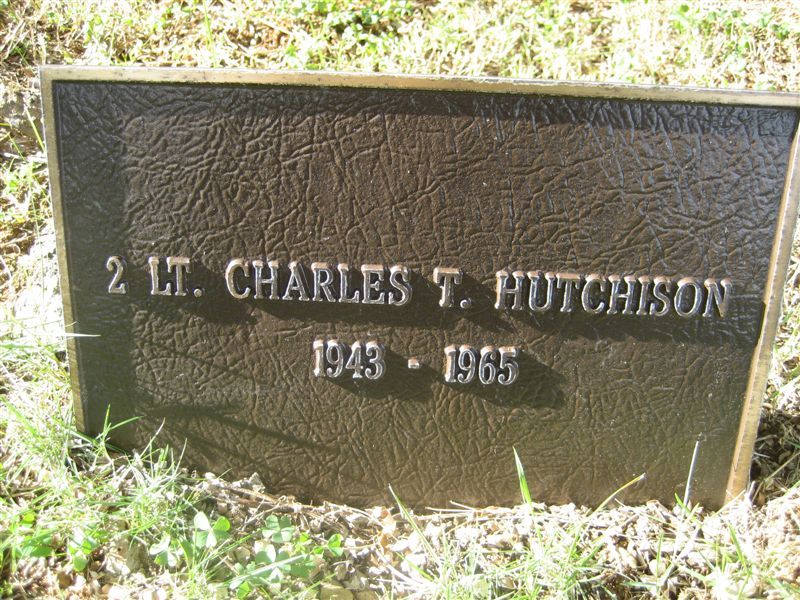
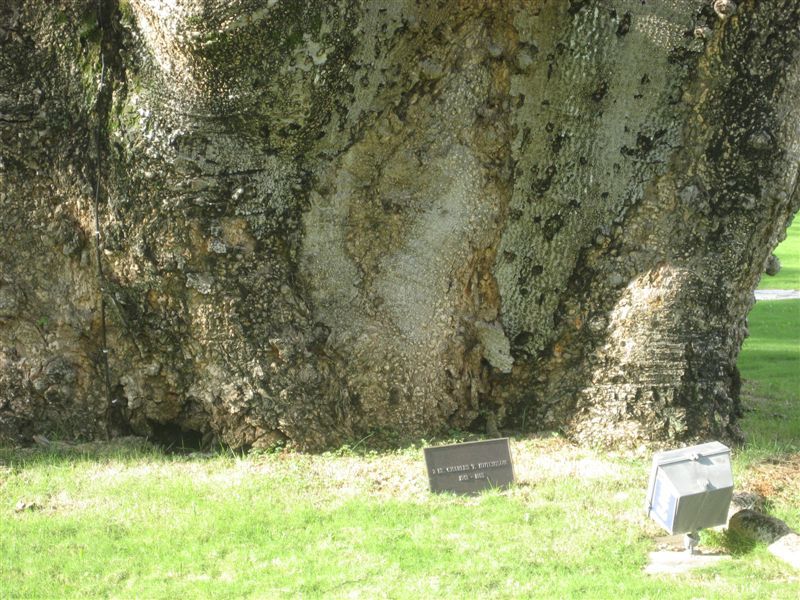
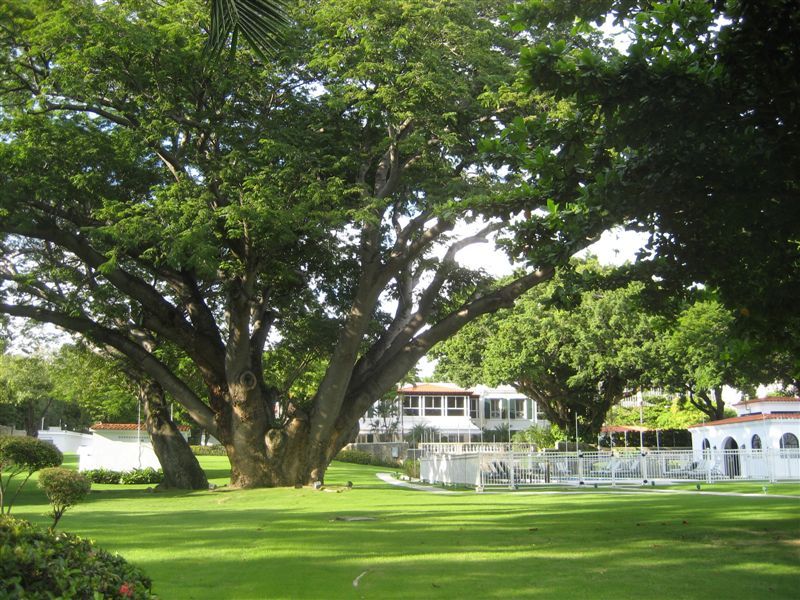
It was a beautiful, sunny and clear day
for the “reunion” for Charlie. There were about 40
people there to celebrate a friend and his memory. It was a tribute
to Charlie that people came from near and far, classmates from
high school and classmates from West Point. His roommate from
West Point, Tom Kerns, has devoted himself to the fact that Charlie
should never be forgotten and he returns every five years to
the gravesite to be with his good friend. Tom was in the Dominican
Republic when Charlie was killed trying to save a fellow soldier’s
life. John Shaner and Tom worked together this year to bring
about this day and it was a warm and touching day to say the
least. I was surprised when I arrived to see as many people,
particularly classmates and fellow basketball team members, already
at the gravesite. We all renewed our relationships as if no time
had come between us. The last time many of us had been together
was at that same gravesite 44 years ago. John then introduced
Tom Kerns to the group and the proceedings began. With Tom and
his fellow cadets recounting somewhat humorous stories of Charlie
and his continual run-ins with the administration at West Point
that led to demerits that put Charlie in great physical shape,
it became apparent that some of the witty person we knew in high
school survived in the military. This was followed by stories
from his childhood and high school years by his KHS friends.
After a brief ceremony, the honor guard played the clearest sounding
and perfect taps I had ever heard and a 21 gun saluted rang out
over the valley……….a sobering reminder of a life
taken too soon. We continued to visit for awhile before meeting
at the Apollo Elks for lunch and more stories. There were some
things that I learned about Charlie that day. Although I had
heard accounts of his death, I didn’t have the actual facts.
Tom recounted what he knew of the day and it was a different
version than the one that I had carried for these 44 years. In
Santo Domingo, there were rebel troops and government troops
and the rebels occupied a section of town with the dividing line
being a street. One side was rebel forces, the other side the
government troops and a machine nest for the rebels was located
in a corner building. Doorways along the street were recessed
and the troops were moving from doorway to doorway advancing
on the machine gun area when one of Charlie’s troops was
hit by rebel fire. Without hesitation Charlie raced out to rescue
his fellow soldier when the sniper fire claimed his life. As
John recounted at the “reunion”, Charlie was not only
awarded the Purple Heart but also posthumously was awarded a
sliver star for gallantry. After talking with friends on Saturday
and recalling water skiing at their camp at East Brady, him hitting
the winning shot in the Ford City game and numerous other recollections
of his “activities” as a teenager, it was a grim reminder
of how fragile life can be. The one thing that was apparent as
we adjourned, was that we were all fortunate to have had Charlie
in our lives, brief as it may have been.
Pictured below is Charlie's West Point class mate and friend
Tom Kerns with his son Hutch Kerns and Grandson Thomas Hutchison
Kerns........taken at the Veteran Memorial Wall in front of the
Armstrong County Courthouse...........Charlie's old home. And
also a remembrance from Tom Kerns.
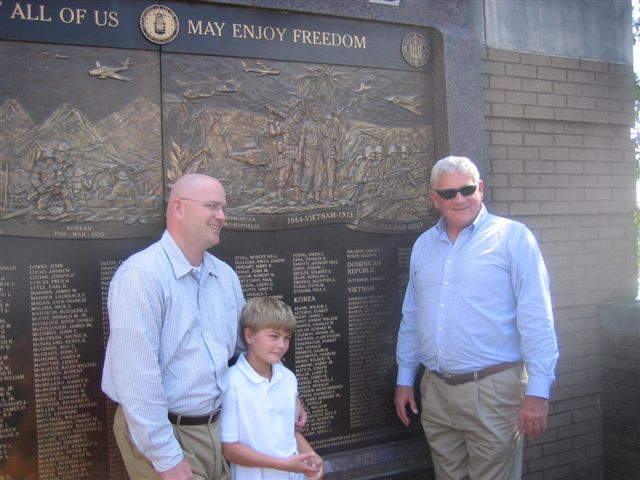
On Saturday September 5, a grave side visit
was conducted in memory of Charlie Hutchison L-2 at Riverview
Cemetery, Apollo, PA. "Hutch" was our first classmate
Killed In Action, dying in the Dominican Republic on May 10th
1965. Classmates in attendance were Ed Mackey, Indiana, PA, Chet
Kempinski, Erie PA, Frank Hughes, Pittsburgh, PA, Rich Stanko,
Omaha, NE and Tom Kerns, Chesapeake, VA. In addition to classmates,
some 35 others from Kittanning High School's Class of 1960, Hutch's
alma mater, were there as well as a number of local friends of
the family. Hutch's only remaining kin, his sister Vicki, had
intended on coming from the big island of Hawaii but as the date
got closer she felt she could not get through the emotion of
the grave and so many close friends. She did send several stories
which were read aloud. I was proud to be able to introduce my
son "Hutch" and his family, including nine year old
"Hutchison" from Asheville, NC. Many attendees offered
reminiscences, both sad and joyful -- all were emotional. Chet
Kempinski read the Cadet Prayer prior to the American Legion
closing. Many of the attendees adjourned to the Apollo American
Legion for lunch and continued sharing stories.
We were successful in attaining support
from the local newspaper, the Kittanning Times-Leader. They published
a human interest story two days prior to the service. We also
received support from the Armstrong County American Legion who
offered a memorial message, honors and Taps.
My family and several others also drove
to Kittanning to see Hutch's name engraved on a veteran memorial
wall adjacent to the Courthouse. Hutch's home is part of the
Courthouse in that his father was Armstrong County Sheriff. Hutch's
name is also on a memorial plaque in the garden behind the American
Embassy in the Dominican Republic as well as a memorial plaque
in the 82nd Airborne Division Museum at Fort Bragg, NC.
Pictured below are all those assembled for the service.
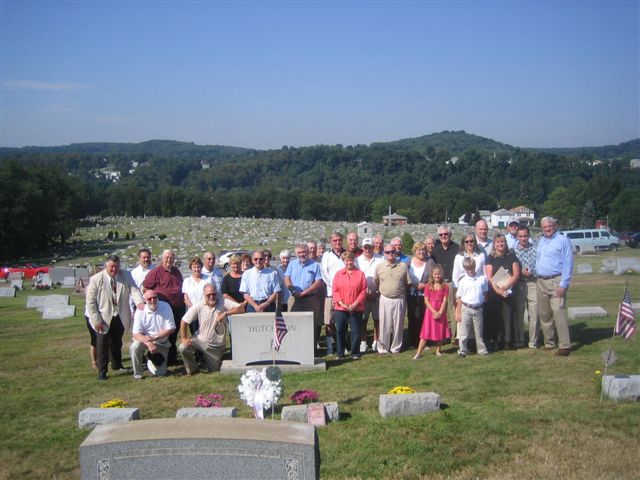 Newsletter to the U.S. Mission, Santo Domingo
Newsletter to the U.S. Mission, Santo Domingo
|